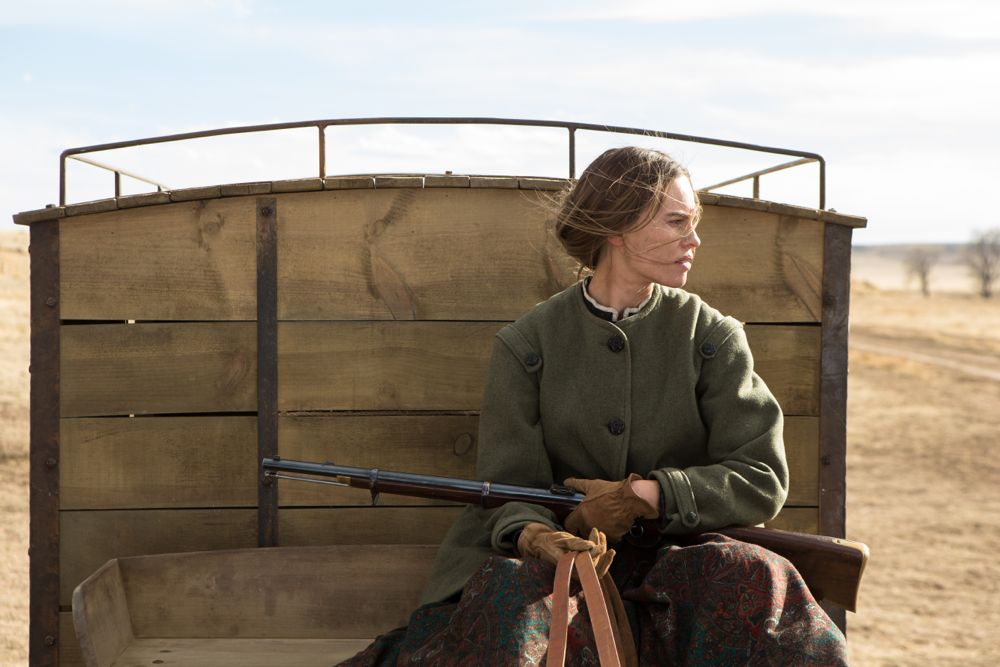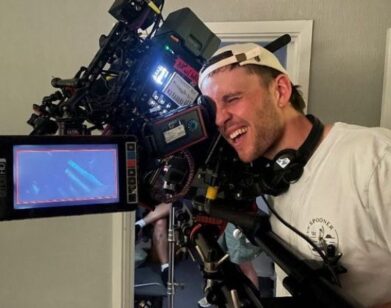Tommy Lee Jones
My motivation for wanting to have all three of those jobs [writing, directing, and acting] is, well, having any two of them makes the third one pretty easy. And I’ve led a visual life. TOMMY LEE JONES
Tommy Lee Jones spends a lot of time thinking about the awesome light out west. He was born into it, in San Saba, Texas, in 1946, and that light has been working on him ever since. For a time, Jones left small-town Texas to go to Harvard, where he roomed with Al Gore and was an All-Ivy League offensive lineman on the football team famed for its legendary comeback against Yale in 1968, a game recounted in the documentary Harvard Beats Yale 29-29 (2008). But he always came back.
As an actor, in the television epic Lonesome Dove (1989) or in his great film work—from his rigid patriarch in Coal Miner’s Daughter (1980) to the dogged U.S. Marshal in The Fugitive (1993), for which he won an Oscar, and the imperturbable sheriff in No Country For Old Men (2007)—Jones often plays outdoorsmen who have been sealed shut by their lives in the searing sun, wizened and weathered by its rays. But if he’s famously portrayed men parched by the light, Jones has reserved a bit of its heat as humor, which he flashes most notably through the extra-dry, intergalactic affairs of Agent K in the Men in Black franchise. And then there is his performance as New Orleans businessman, and alleged assassination conspirator, Clay Shaw in Oliver Stone’s JFK (1991), in which Jones melts down that light and heat to make mercury, giving his Shaw a kind of sadistic charisma, a garrulousness, violence, dominance, and quicksilver allure utterly his own.
As a director of movies mostly set “on the west side of the Mississippi River,” as he says, with “horses and big hats,” Jones is intently studying the western light. In his made-for-TV movie The Good Old Boys (1995), in The Three Burials of Melquiades Estrada (2005), (and, in a different way, 2011’s HBO movie The Sunset Limited, which he directed from the play by Cormac McCarthy), and in his new film, The Homesman, out this month, Jones paints western tableaux with the sort of elemental characters and themes of myth—the good ‘uns and bad ‘uns, the tricksters, thieves, and the oppressed womenfolk out of the McCarthy and Larry McMurtry schools. The Homesman, which Jones and his writing partners adapted from the Glendon Swarthout novel, is set in the Plains territory of Nebraska and state of Iowa in 1855, and occupies itself primarily with the plight of those women—and one woman in particular, the righteous and heroically unloved Mary Bee Cuddy, played by Hilary Swank. As the 68-year-old actor-director tells his longtime friend, and co-star in The Homesman, Meryl Streep, Jones made this movie as an exploration, a way to understand what’s wrong with women and men.
When Streep placed the call this past September, the leaves were just beginning to turn outside her window in Connecticut, while in San Antonio, where Jones lives, a big rain had made everything green and clean and then cleared out to let in the light.
MERYL STREEP: When was it that we first met, do you remember?
TOMMY LEE JONES: I remember it was sometime around 1972. I think we were both doing plays at the Public Theater. I had heard about you. And the Public Theater used to be a library, I think, because it has labyrinthine hallways and spaces. There was one hallway where I could open the door to a tiny little balcony, not more than two feet deep, from which I could look down on you while you rehearsed.
STREEP: I think the first time I ever saw you, you were playing football.
JONES: That’s possible. But we actually met across the street on Lafayette, in front of that actors’ saloon called the Colonnade. You had on a pink, fuzzy pillbox hat.
STREEP: [laughs] Oh my God. Well, hell.
JONES: You made that hat look pretty good.
STREEP: Well, you made Sam Shepherd look pretty good. When did you start acting? You played football at Harvard, and actually, your Coriolanus at Harvard is legend in our family—we were just talking about it this last weekend, about how somebody from the Boston Globe wrote a review of it, a student production, saying it was a great performance.
JONES: I started when I was in the second grade. The entire elementary school in Rotan, Texas, presented a theatrical production of Snow White and the Seven Dwarfs. And the part of Sneezy fell to me.
STREEP: [laughs] Naturally.
JONES: I took that very seriously. Actually, that play was the beginning of my career in the media, as well, because in Rotan at that time, the radio station was above the drug store, and it wasn’t very big. It was smaller than your trailer, but it had one of those radio microphones about the size of a dinner plate. And they brought the teacher, who was also the director, and the seven dwarfs into the radio station and lined us all up, and each actor was introduced and told to do something indicative of his character. She called my name and, of course, I sneezed.
STREEP: Wow, that’s hard! Can you still sneeze on cue?
JONES: I can, but I charge more for it than I did when I was seven years old. I’ve been an actor ever since, really.
STREEP: What was the first serious play you remember being in?
JONES: Well, my parents went to Libya. My dad worked in the oil business, and I was about to go into the ninth grade, and I knew that they didn’t play football in Libya, so I didn’t want to go. We found a prep school in Dallas where they took homework very seriously. I had a real struggle accommodating myself to that. But they also took the theater pretty seriously …
STREEP: So you boarded there?
JONES: Yeah, and I was walking around the campus one day and, just out of curiosity, looked in the door of the theater. I saw a play in rehearsal, and that felt pretty comfortable. It felt pretty good. And I said, “That’s probably something I want to do.” And the next play they did was a good play for a boys prep school …
STREEP: Was it Twelve Angry Men?
JONES: It was The Caine Mutiny Court-Martial.
STREEP: Oh, close!
JONES: Yeah, the set is just a courtroom. All of the costumes are khaki uniforms, all of the parts are male. I played the young lieutenant, Stephen Maryk.
STREEP: What was the first play you did at Harvard?
JONES: I started looking for chances to get into the theater as soon as I got there. And a couple of weeks into the year, I went to Henry Nicholson Lamar, who was the freshmen football coach, and who had been coaching there since before the day I was born. I said, “Look, I’m interested in acting. I auditioned for and have the chance to play a part in The Tempest. Do you think there’s any chance that I’m going to be able to start on this football team? Because I’m looking at football and I’m looking at theater, and I want to know what my prospects are.” And he said, “I don’t know how well you’re going to do, but I can tell you that you’ve got four more years to play football, and you can be an actor for the rest of your life.”
STREEP: Ooh, what a great coach.
JONES: He was truly a great coach. He was a beloved coach at Harvard. I wanted to play that part very much, and I was so proud of myself when I was cast, but I decided to play football, and what I did instead was a workshop with a fellow on the English faculty named Dan Seltzer, who worked with me on Act III, Scene III of Othello, the scene where Othello’s mind is turned around by Iago. The central prop is what T.S. Eliot called an objective correlative—Iago says he has noticed a handkerchief spotted with strawberries wiping the beard of one Michael Cassio of Florence. I really enjoyed working on that, but we never performed it. My first play was probably one of those Pinter plays—The Caretaker. I did three Pinter plays while I was there. Two years of summer repertory and a whole lot of other plays. By the time I got to New York, I had done over 20 of them. Once in New York, I moved in with a former college pal and started looking for work. It was a very scary time, but 10 days later, I had a job on Broadway. That would’ve been the summer or early fall of ’69. And the fact that I got a job on Broadway that quickly was mentioned in Ripley’s Believe It or Not! It was one of John Osborne’s last plays, called A Patriot for Me, starring Maximilian Schell. I actually wound up playing six different parts. And one of them had a line! [Streep laughs] It scared me to death.
There’s an undeniable tradition of sexism in this country that ties into the move westward by people of European descent, and different ways of looking at Manifest Destiny on the west side of the Mississippi River. TOMMY LEE JONES
STREEP: Oh, I bet. But really fun.
JONES: I loved being an actor in New York and working in the theater.
STREEP: When did you turn to directing?
JONES: About 20 years ago, I directed a movie for Ted Turner’s television network, based on a book written by a Texas writer by the name of Elmer Kelton. He wrote over 50 so-called “western” novels. Three of them are good. The one I co-adapted to a screenplay and directed was called The Good Old Boys, and it’s just a family film. You can take your grandkids to it.
STREEP: I’ve never wanted to sit outside of the character and look at it at the same time. I understand actors wanting to direct. I don’t understand how you can do both things at once. What made you say, “Goddammit, I’m going to do this because I think I can”?
JONES: That’s pretty much my motivation: I’m going to do this because I know I can. My motivation for wanting to have all three of those jobs [writing, directing, and acting] is, well, having any two of them makes the third one pretty easy. And I’ve led a visual life. I took a lot of courses in art history in college.
STREEP: But the imaginative job of an actor is a very different sort of kettle of fish from what the job of a director is.
JONES: That’s why I don’t see any conflict. They’re just two different jobs.
STREEP: What I noticed while working with you as an actor is that your concentration was total. And when I worked with you as a director on The Homesman, I sort of marveled at how effortlessly you got up out of your chair and walked into our world. What is that?
JONES: I’ve just paid a lot of attention all of my life on these movie sets, and I’ve got a pretty good practical education around the camera. It’s important for me as an actor to know the entire script before you start shooting, and especially if you’re directing, you don’t want to be struggling with anything.
STREEP: I don’t know many actors who learn the whole script before day one.
JONES: I’ve always done that. You can’t change your mind until you make it up.
STREEP: [laughs] Mine is so frequently made up right away. I want to talk about this movie, which I thought was profound, funny, unbearable, and ravishingly beautiful. I love movies that give you a lot to chew on. So much of it is about the loneliness and the haplessness of women at this time in the mid-19th century—their dependence on the strengths or the steadfastness of men who so often failed them. You have a very weak preacher—[John] Lithgow was amazing in that part—and the impoverished or insensitive or brutal husbands, and the completely unreliable man who calls himself Briggs [the rascal claim jumper and ne’er-do-well played by Jones in the movie]. What pulled you to consider life from the female point of view?
JONES: Well, my grandmother, my mother, my wife, and my daughter are all women. A lot of my dear friends, yourself included, are women. I am just interested in how they feel, and what’s wrong. And if you want to know what’s wrong today, looking at what was wrong yesterday is a pretty good place to start. There’s an undeniable tradition of sexism in this country that ties into the move westward by people of European descent, and different ways of looking at Manifest Destiny on the west side of the Mississippi River.
STREEP: Some of the first freedoms were won by western women. The women of Wyoming were the first to vote, almost half a century before we got it back east.
JONES: Right. So those struggles and what made them a struggle is of interest to me. I like to make movies on the west side of the Mississippi River, and a lot of times the movies I direct have horses and big hats in them and get called westerns, but that’s okay. I used to resent that, but I don’t anymore.
STREEP: And that landscape is completely distinct.
JONES: It certainly is. It’s beautiful country, and I’m at home there. I love looking at it and I love photographing it even more. And if you can provide what you know with a narrative that has originality to it, you’re on your way to making a good movie.
STREEP: Well, it certainly is original. Hilary [Swank] is so splendid. She’s so simple and uncovered in this part—she’s almost as clear as the landscape itself.
JONES: I was very proud of her. I thought about her for the role for as much as three seconds, and I knew we had to do everything we could to persuade her to play that role because she’s perfect.
STREEP: She’s a hero in the western tradition.
JONES: A hero and a victim, and the many different angles are worth our attention.
STREEP: When this film begins, we think we’re watching her story. But at a certain point, we’re carried away by a different character. Have you ever seen a film do that, start on the shoulders of one protagonist and move to another?
JONES: Not that I know of.
STREEP: Nobody’s ever done that. And so much of the movie is about human relationships as transactional—you give me this, I’ll give you that.
JONES: Well, yeah.
STREEP: Women come out on the short end. The tender emotions, the things that you associate with the best of life—the love of the woman for her mother or a man for his wife or a girl for her babies or a woman for music or the yearning of people for God—in this film, they seem doomed.
JONES: I’ve avoided using the word imperialism because I’d like for people to figure it out. Mary Bee Cuddy [Swank’s character] is sacrificed. And that leads to George Briggs’s redemption.
STREEP: It’s like the most glorious thing in life is the selfless act. And what he says to Hailee Steinfeld’s character at the very end …
JONES: “You are the living, breathing reason she will never be lost.” This young girl is self-sufficient, she’s honest, and she is humiliated by poverty but very proud, and she represents the best of western womanhood, just as Mary Bee did. And that’s what’s on Briggs’s mind. He’s a bit more sensitive now than when we first met him. He cares about this girl. He warns her to stay where she is.
STREEP: But then he says, “Why don’t we marry?” And he is amused by how she weighs that transaction. Mary Bee Cuddy has been trying to marry anybody, everybody—and even with her beautiful 31-year-old self, everybody turns her down. But this old, cursed son of a bitch can get a 16-year-old to say, “Maybe.” God, that’s so fucked up!
JONES: I thought it was funny.
STREEP: It was funny.
JONES: And there’s a depth of irony there that’s relevant to our narrative, I think. Are you familiar with the work of George Caleb Bingham?
STREEP: The paintings of the Mississippi, wasn’t it?
JONES: He liked to paint pictures of boatmen. And his outlook on the western movement, by what had become known as Americans, is always very robust and optimistic and full of this glory, this almost Biblical light. He’s got one picture of Daniel Boone marching through the Cumberland Gap with legions of settlers and pioneers on both sides. From my sensibility, it’s full of irony and not related to the truth in any way. What I try to do with Bingham in the last images was to tear him up and his point of view. Those images are derived from Bingham, but they have something entirely different to say.
STREEP: I have acted with Clint Eastwood where he’s directing himself, and it seems like he’s always reluctant to give the actor part of himself permission to indulge in something kind of wild. And this is the greatest thing about how you divide your time, because a director who is not also the actor would give an actor this permission, but it’s really unusual that you would allow yourself the freedom that’s in that moment, and it is gorgeous.
JONES: You started the interview by asking me about pride, and what I almost said was, “Listen, Meryl, pride is a sin, and I try to avoid it.” But I can tell you I’m very proud of this movie and proud of myself because you showed up. It means the world to me.
STREEP: That was one of the hardest days I’ve ever done on a film. I don’t know why.
JONES: Those clothes are painful. What are you doing now?
STREEP: I’m playing an aging rocker who’s got a band, and we play cover songs in San Fernando Valley bars.
JONES: That’s perfect for you.
STREEP: Jonathan Demme is the director. Rick Springfield is my lead guitarist. Rick Rosas from Neil Young’s band is on bass. I’ve got an amazing band. And we’re all over 65, so it’s pretty funny. [laughs] Well, you have the touch, man. Keep me in mind for the next one. If you have any parts for old ladies, I can play guitar now.
MERYL STREEP IS A THREE-TIME ACADEMY AWARD-WINNING ACTRESS. SHE WILL BE SEEN IN THE UPCOMING FILMS INTO THE WOODS AND SUFFRAGETTE.







